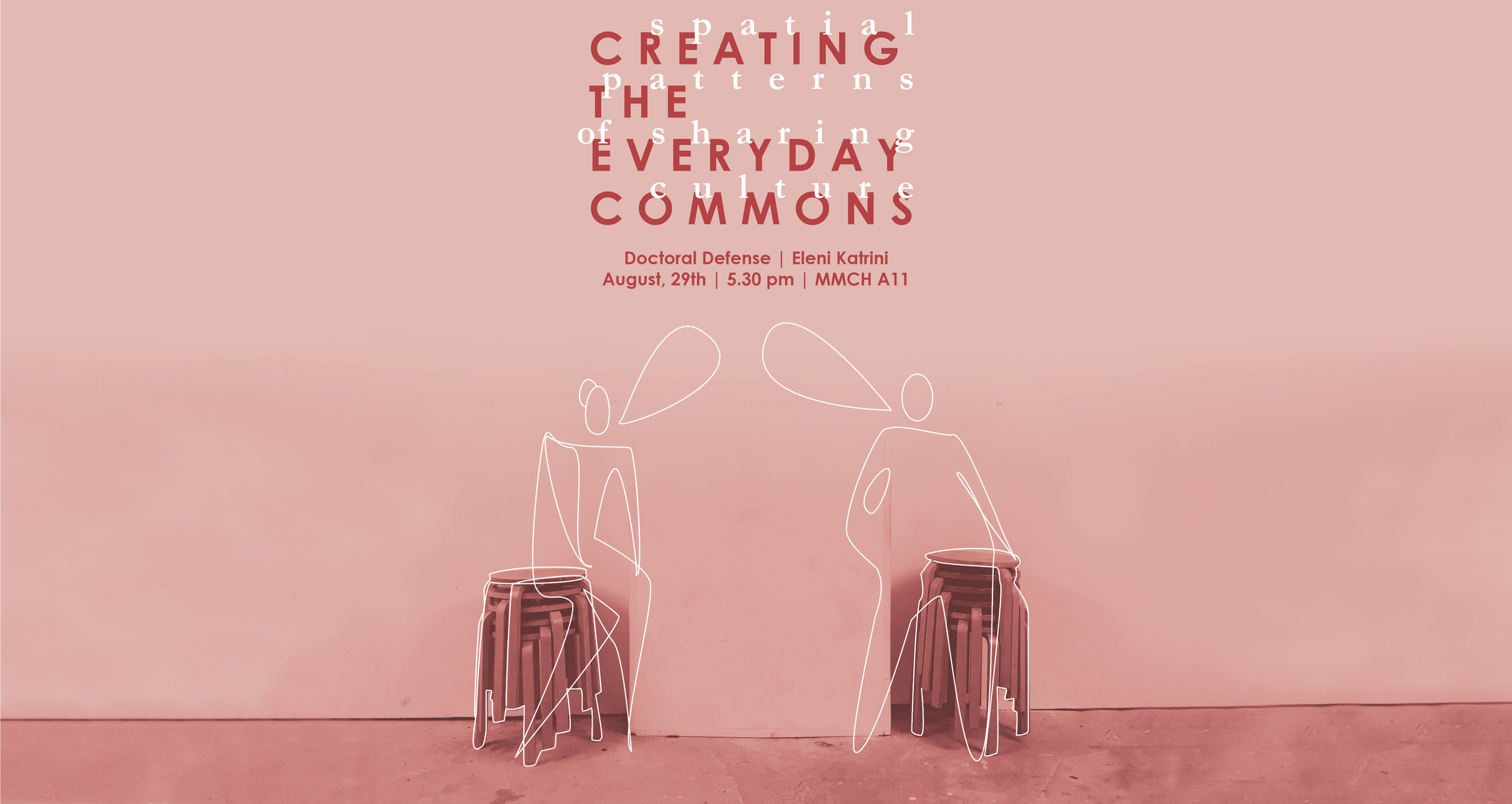Eleni Katrini will present the defense for her dissertation, entitled "Creating the Everyday Commons: Spatial Patterns of Sharing Culture," to obtain the PhD in Building Performance & Diagnostics (PhD-BPD) on Thursday 29 August.
Date: Thursday, 29 August 2019
Time: 5:30pm
Location: MMCH A11
PhD Advisory Committee
Professor Vivian Loftness, School of Architecture, Chair
Dr. Cameron Tonkinwise, School of Design, University of Technology Sydney
Dr. Matthew Mehalik, Heinz School of Public Policy and Management
Title: Creating the Everyday Commons: Spatial Patterns of Sharing Culture
By: Eleni Katrini, PhD-BPD Candidate
Abstract
People in neighborhoods across the world come up with creative ways to satisfy their daily needs through sharing and collaboration, by creating alternative solutions that are resourceful and socially engaging. These creative communities based on sharing provide local solutions through a more substantial use of human, environmental, and economic resources. Since the mid-2000s, sharing and collaborative practices have received increased attention mainly because of socio-economic rapid changes within cities and the wider use of online services.
This thesis recognizes sharing culture as a potential pathway towards more inclusive and environmentally sustainable societies and identifies three main lines of inquiry based on research areas that necessitate further investigation. The first line of inquiry relates to the semantics and value of sharing culture. The rise of sharing economy has led to an ideological contestation over the meaning of sharing, placing under the same umbrella contradicting practices and thus demanding further examination. The second line of inquiry aims to investigate how sharing practices emerge and evolve over time, what challenges they face, and identify transitional pathways towards sharing culture. Finally, and most importantly, the third line of inquiry seeks to identify spatial patterns of sharing culture. Within the fields of sharing culture, collaboration, and urban commons, the relationship between space and sharing practices within urban contexts has been studied from sociological, political, and geographical perspectives. Nevertheless, there is room for further investigation from an architectural and urban design perspective, on how sharing practices emerge in urban neighborhoods and how space influences them. Specifically, this thesis aims to uncover spatial patterns on three distinct spatial scales: building, threshold, and urban. On the building scale, spatial patterns are explored regarding the relationship between the practices and the spaces they occupy; on the threshold scale, spatial patterns that relate to the interaction between the practice and the broader community; while on the urban scale, patterns of urban dynamics, land use, exposure, and local networks are investigated regarding the practices’ locale.
Along these three lines of inquiry, this dissertation offers four main contributions. The first one is a theoretical framework of sharing culture identifying: a taxonomy of how it can embed in everyday life, the value it brings to both communities and individuals, and the ways that sharing practices can amplify their impact by scaling-from-within. This framework was developed through a semi-systematic literature review on sharing, combined with findings from fieldwork, and by using Max-Neef’s model of human needs’ satisfaction.
The second contribution is building an interdisciplinary research framework to study sharing culture and reveal its spatial patterns through a situated approach, which synthesizes methods from social sciences and theories of practice, architecture, urban design and planning. Specifically, the research framework proposes a combination of qualitative analysis of participants interviews and online documents, with observations, architectural drawings, and extensive cartography to study spatial conditions across all three scales.
The third contribution is the application of the interdisciplinary research framework on sharing culture practices in London, UK, and Athens, Greece, resulting in four in-depth case studies with thick description and spatial findings across all three scales: building, threshold, and urban. The findings from the case studies are further substantiated by additional literature review on theories of social change, transition design, and sharing practices to create the fourth and last contribution of this thesis: a series of actionable spatial patterns. The spatial patterns of sharing culture showcase – both in a descriptive and propositional manner – spatial conditions that enable sharing culture. They aim to prompt designers and communities to view sharing practices through a spatial lens and help them leverage space as a catalyst for sharing culture.

